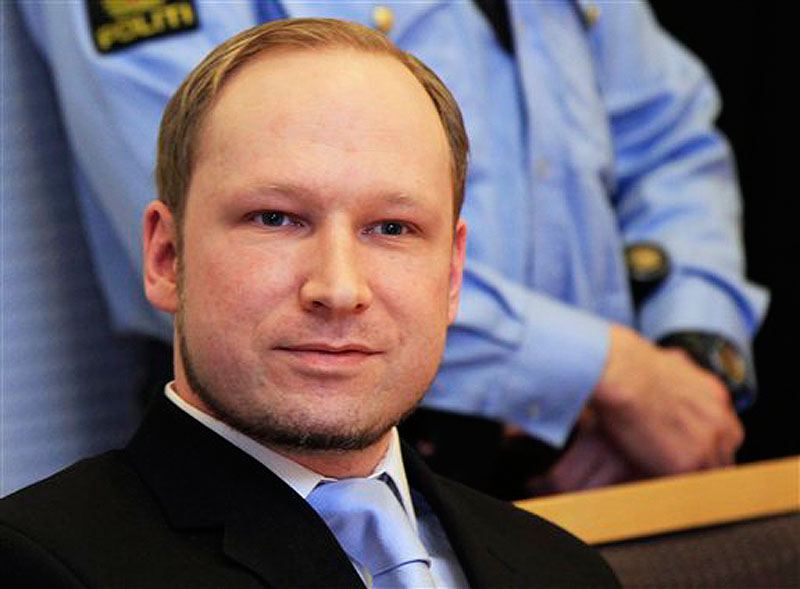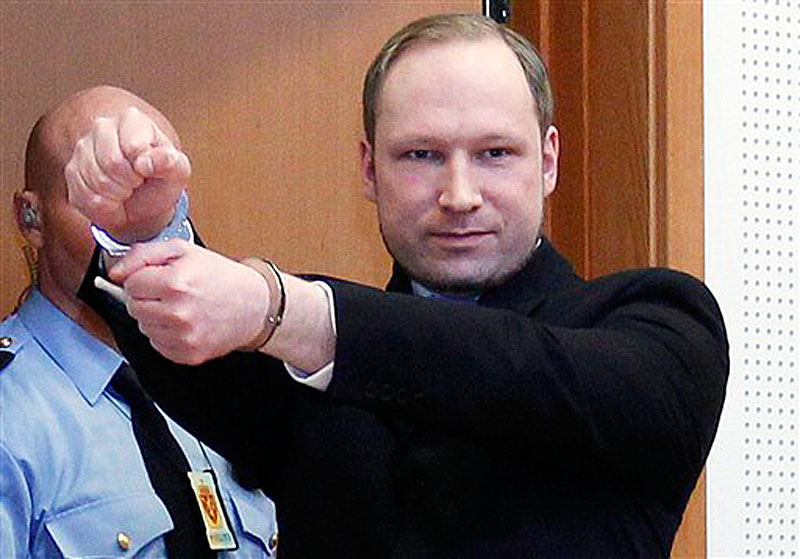OSLO, Norway — When Anders Behring Breivik goes on trial next week, both the prosecution and the defense will say he killed 77 people in a bomb-and-shooting massacre that jolted the world’s image of terrorism.
The only question now is whether the self-styled anti-Muslim militant was sane when he did it — and after a new psychiatric assessment Tuesday, even that may no longer be in dispute.
“Our conclusion is that he (was) not psychotic at the time of the actions of terrorism and he is not psychotic now,” Terje Toerrissen, one of the psychiatrists who examined Breivik in prison, told The Associated Press.
The twin attacks on July 22 — a bomb in Oslo’s government district followed by a shooting spree at the governing Labor Party’s youth camp outside the capital — brutally shocked Norway and reminded the West of terror threats other than al-Qaida.
The blond, blue-eyed gunman surrendered to police on a lakeside island where the bodies of his many teenage victims lay scattered. He claimed he was the Islamic terror group’s antithesis, a modern-day crusader waging a war against Islam in Europe.
Breivik confessed to the attacks but rejected criminal guilt, saying he had acted to protect Norway from being overrun by Muslims by targeting the left-leaning political establishment he claimed had betrayed the country with liberal immigration policies.
The psychiatric report presented to the Oslo district court on Tuesday backed up Breivik’s own claim that he is sane, and contradicted an earlier assessment that declared him psychotic and suffering from paranoid schizophrenia. That first diagnosis was met widespread criticism, prompting the court to order the second review.
Breivik’s defense lawyer, Geir Lippestad, said the new report means Breivik’s testimony will be crucial “when the judges decide whether he is insane or not.” The trial starts Monday and is scheduled to last 10 weeks.
Asked whether Breivik will defend his actions in court, Lippestad said: “He won’t only defend it, he will also regret that he didn’t go further.”
It’s up to the judges to decide whether Breivik is mentally competent to be sentenced to prison. If not, he will be committed to compulsory psychiatric care. Either way, there are provisions in Norwegian law that could keep the 33-year-old locked up for the rest of his life.
But to some, the diagnosis has broader implications in how the attacks are viewed.
“If he’s insane, it’s very hard to pin it on anybody else,” said Hans Rustad, who runs one of the many right-wing, anti-Islamic blogs that Breivik cited in an online manifesto before the attacks.
In his 1,500-page document, Breivik claimed to be part of a secret right-wing militia modeled after the medieval Christian military order known as the Knights Templar. Its goal, he claimed, was to purge Europe of Muslim influence in a revolution that would target what he called “cultural Marxists” in the initial phase.
Investigators have found no trace of the group and say Breivik plotted and carried out the attacks on his own. A leaked copy of the initial psychiatric examination described his crusader fantasy as a token of the “bizarre, grandiose delusions” of a sick mind.
A diagnosis of insanity would make it easier for far-right bloggers and politicians to dissociate their political views from Breivik. They have denounced his attacks as the work of a madman.
But some suggest they have a degree of moral responsibility for agitating online against Muslims.
“To me it’s obvious that even if he is insane there is definitely a political element,” said Oeyvind Stroemmen, a Norwegian Green Party member who had warned before the attacks that hardening anti-Muslim attitudes in Europe could turn violent.
Breivik was charged with terrorism and premeditated murder last month in an indictment that traced his steps from parking a van with a 2,100-pound (950-kilogram) fertilizer bomb outside a building housing the prime minister’s office at 3:17 p.m. to his surrender to police on Utoya island three hours and 18 minutes later.
Eight people died in the bombing, while 69 people — mostly teenagers — were killed on Utoya. Dozens more were wounded as the gunman, disguised as a police officer, opened fire on unsuspecting youths gathered for an annual summer retreat.
In the indictment prosecutors assumed that Breivik was mentally ill and said they would seek compulsory psychiatric care instead of imprisonment unless new information about his mental health emerged.
The latest psychiatric report was confidential, but national broadcaster NRK and other Norwegian media who claimed to have seen its conclusions said it described Breivik as narcissistic but not psychotic.
Prosecutor Inga Beijer Eng told the AP on Tuesday it was too early to say which of the assessments would be given most weight. “We will not decide on what kind of punishment we will ask for until the end of the trial,” she said.
Breivik’s lawyers said before Easter they plan to call radical Islamists and right-wing extremists to testify during the trial in an attempt to show that there are other people who share his world view.
Lippestad said the point is to prove that there is a narrow group of like-minded people who “look at things the same way, who are of the opinion that we are in war, the Muslim and the Christian world.”
Send questions/comments to the editors.




Success. Please wait for the page to reload. If the page does not reload within 5 seconds, please refresh the page.
Enter your email and password to access comments.
Hi, to comment on stories you must . This profile is in addition to your subscription and website login.
Already have a commenting profile? .
Invalid username/password.
Please check your email to confirm and complete your registration.
Only subscribers are eligible to post comments. Please subscribe or login first for digital access. Here’s why.
Use the form below to reset your password. When you've submitted your account email, we will send an email with a reset code.